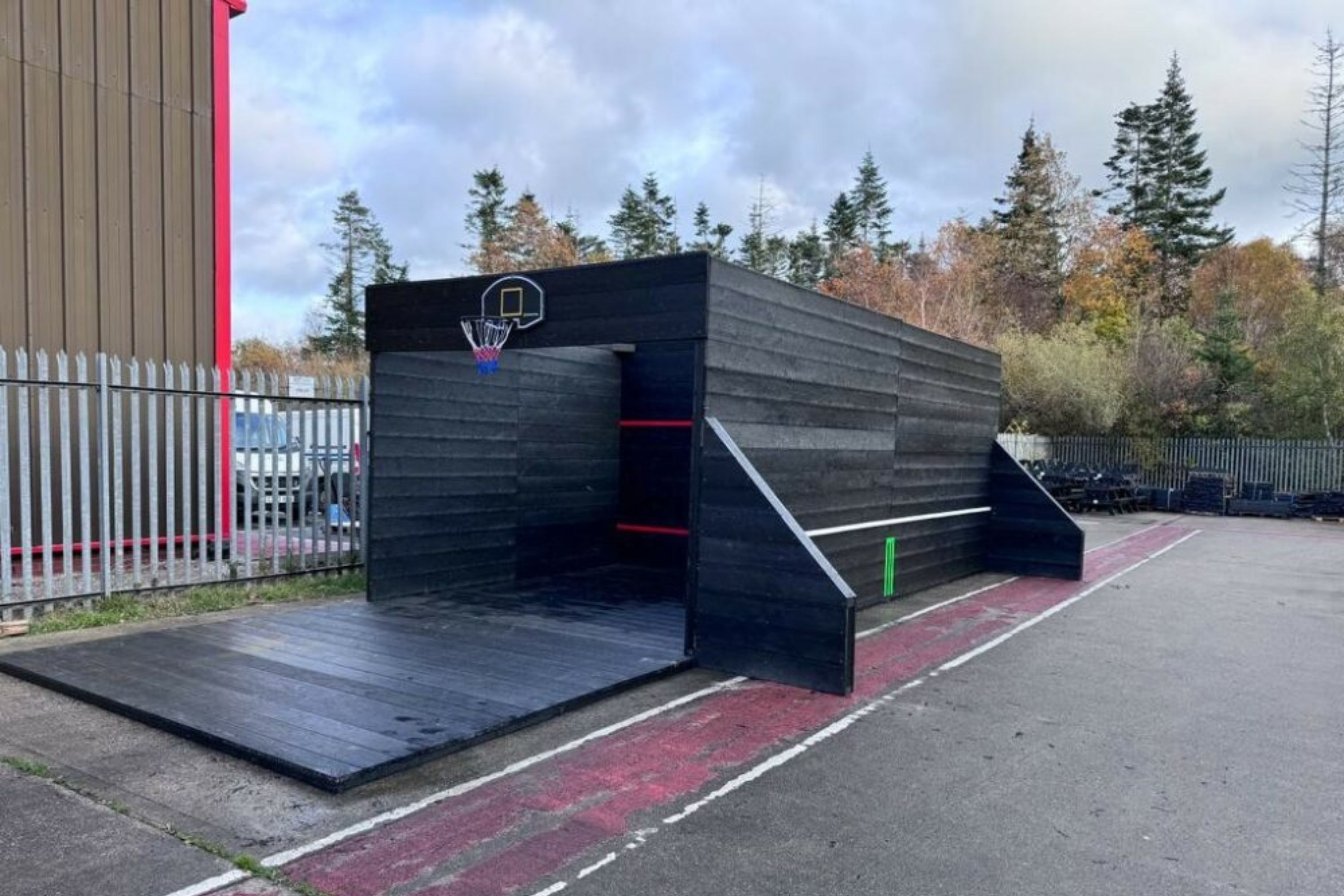NEWS | INNOVATIVE SPORTING ECO PROJECT ‘WOULDN’T HAPPEN WITHOUT THE SAINSBURY MANAGEMENT FELLOWS NETWORK
Published On: Tuesday, 23rd Jan 2024

An innovation designed to tackle inner-city inequalities and attract people to new sports wouldn’t have come to fruition without the Sainsbury Management Fellowship (SMF), according to its founders.
SMF duo Henning von Spreckelsen and Michael Hill have teamed up to create what’s thought to be the world’s first carbon negative, all-weather, multi-use sports court – as well as providing places for children to eat and do their studies.
The modular court, which can be used for tennis, squash, wall-ball, cricket, football and basketball is made out of a carbon negative replacement for wood, steel and concrete at Plastecowood, where Henning is Technical Director.
Michael is the founder and chairman of Rackets Cubed – a charity supporting a thousand Key Stage 2 children each week through its activities which link racket sports, nutrition and education.
The pair have known each other for years as part of the network of SMFs – engineers who were awarded scholarships to undertake MBAs at the world’s top business schools.
And it was a chance conversation on the balcony of the All England Lawn Tennis Club at Wimbledon that led to the innovative project coming about, with Michael and Henning joined by Satinda Bajwa – a trained aerospace engineer, the founder of Indian racket sports and education charity Khelshala, and former coach of world number one squash player Jansher Khan.
Henning said: “After we had played, we were on the balcony at Wimbledon talking about all the engineering work that had gone on across the club when Satinda told us about the problems he was having in India, with his courts being trashed by the monsoons.
“I immediately knew the material he’d need, and we got talking about it and everything spiralled from there.
“It’s an engineering solution to a sustainability problem, but also addresses inequalities. And we have the community to make it happen.
“The original idea started out as an outdoor squash court, but as people got enthused by it and by addressing problems we found, we realised we could add other bits on, like a basketball hoop, or cricket stumps or football ‘goals’.”
The sustainable material used has been created from mixed plastic packaging waste – like bottle tops, crisp packets and shrink-wrap.
With a life expectancy of around a hundred years, the 5-tonne structure not only saves 125,000 bits of packaging waste from going to landfill – and therefore generating 12.5 tonnes of carbon savings – it is also cheaper than the alternative permanent structures like Multi-Use Games Areas, leading to positive interest from local authorities, charities and community groups.
After a prototype built at Plastecowood’s Rhyl factory received a good response from leading representatives of squash and tennis communities, plans are being readied to place courts in London, Manchester and Birmingham for testing.
Michael said: “A lot of sports charities and councils have been looking at getting this infrastructure into inner-city locations for years. Our aim is to work with local authorities and place prototypes to see how they stand up to use, so we can evaluate it and make the next version.
“We’ve found that the courts had additional properties that we hadn’t thought about. It’s actually a low-slip surface, allowing you to play in the rain, the bounce is hardly affected in those conditions either, and it has incredibly good acoustic properties to minimise sound issues.”
Henning added: “Having this in communities will help us understand how exactly people will use them. We made significant improvements from our first product test, so we’ve had the engineering input, we now need to have user input. Then version three will, hopefully, be ready for roll out.”
The duo believe the innovation would not have come to fruition had they not have been given the opportunity to study for an MBA and become part of the prestigious SMF network.
Michael said: “The MBA gives you the confidence to tie all the different business aspects together and find solutions to problems. It’s not just about finding a financial solution, or a sporting solution, or an engineering solution. The MBA gives you the lateral thinking to find a solution for all of them.
“With the confidence that the SMF award provides at such a young age, it gives you the knowledge to know immediately when an idea is bad, but also the knowledge to know when something will work and how to bring it to life. It’s that difference that is enhancing.”
Henning said: “You couldn’t script it. We just happened to have three people there at once that could solve the issue. Without the Sainsbury Management Fellowship, this simply wouldn’t have happened.”
Find out more about becoming a Sainsbury Management Fellow.

